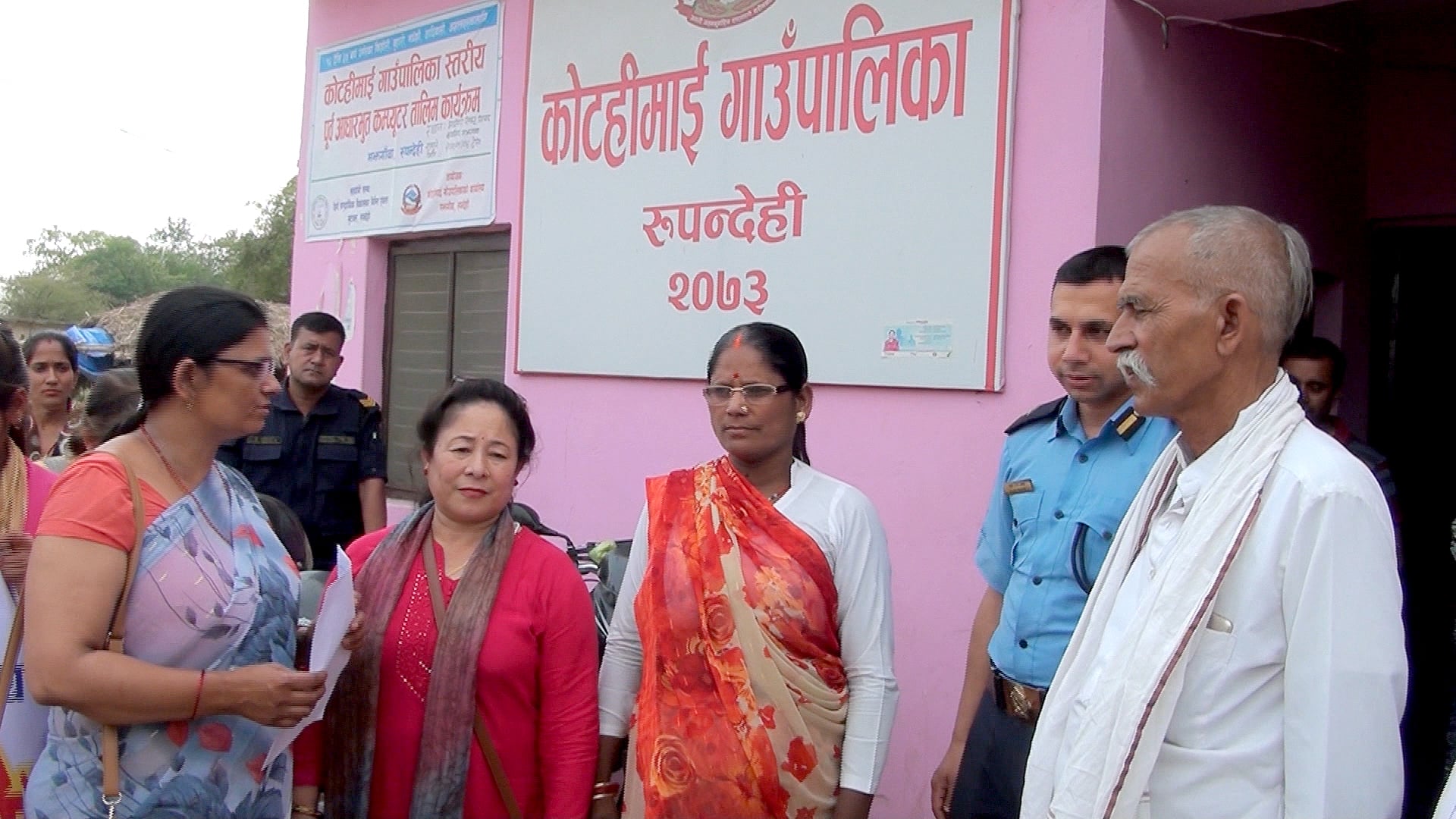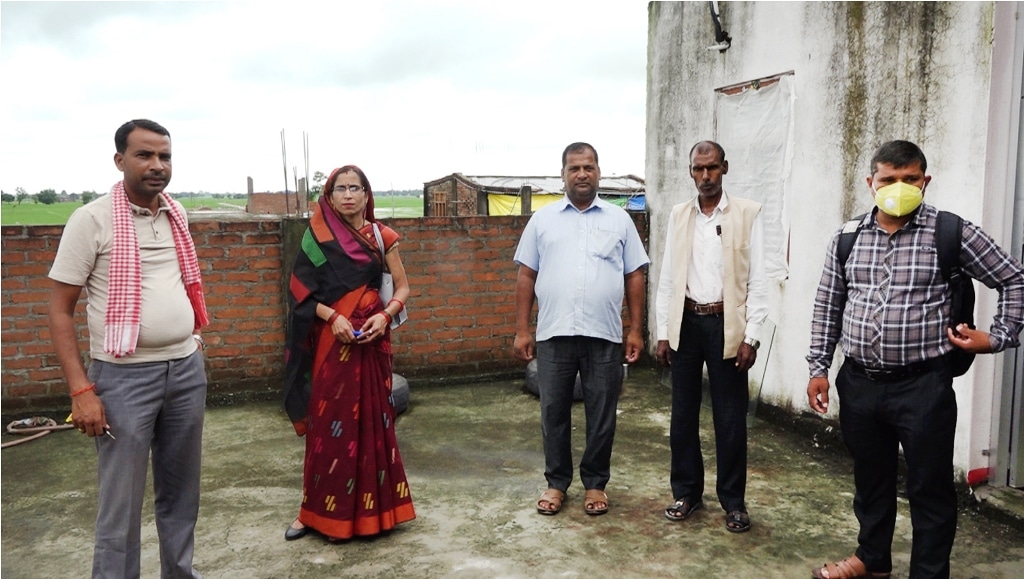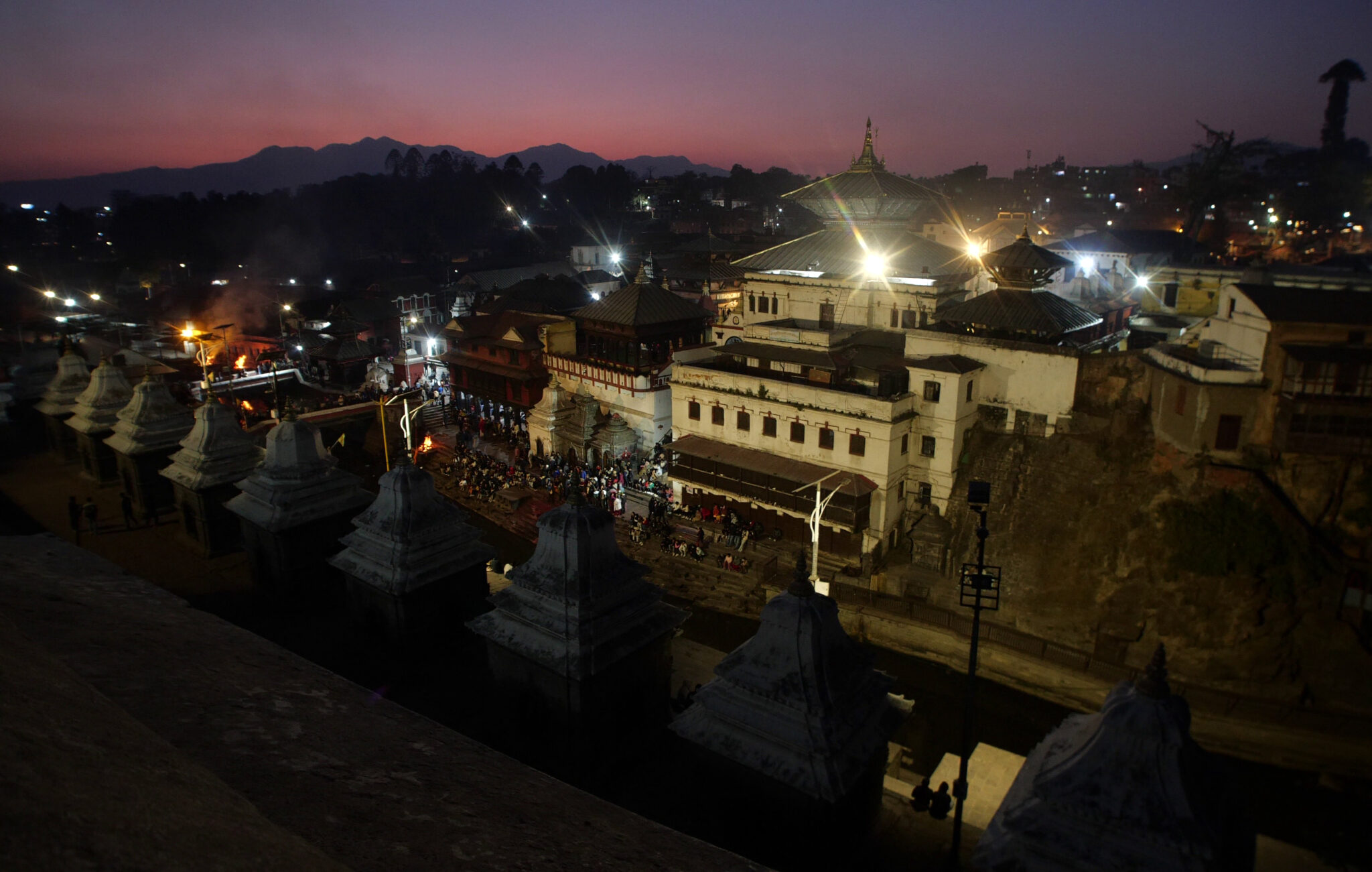Instead of mitigating violence against women on witchcraft charges, Rupandehi’s local unit officials appear to be abetting it.
Amrita Anamol | CIJ, Nepal
On the misty dusk of November 23, 2021, Jagamati Pasi, 62, of Sammarimai-7 in Rupandehi was seated on her house’s front yard, readying vegetables to cook for dinner, when a group of her neighbor Ramjanam Yadav’s family began to shout at her, accusing her of practicing witchcraft. They demanded she “withdraw the spell” that she had cast on Ramjanam’s two-year-old son, a spell, so the allegations went, that had robbed the infant of his appetite, caused him to vomit and experience sudden fits. Jagamati, who was alone, couldn’t argue. Fearing she’d be attacked, Jagamati entered inside her home and shut the door. The neighbors returned back after scattering paddy grains, black eyed beans, sesame seeds and a piece of black cloth on Jagamati’s yard.
Jagamati couldn’t come out of her home that day; the next day, she solicited help from her other neighbors, none of whom paid any heed to her concerns. She then went to Priyanka Singh, the rural municipality vice-char and coordinator of its justice committee. Singh’s husband, Pawan Singh, and father-in-law, Rajkumar Singh, overheard their conversation.

Bhanamati Baniya (in white blouse), deputy chair of Katahimai Rural Municipality, informing service seekers about service procedures. Photos: Amrita Anamol
The father-son duo suggested that Jagamati ‘live in harmony with the villagers and not pick up a fight over small matters’. The next day, Jagamati reached the rural municipality office. There, too, she was turned back, for her complaint was ‘a small matter that keeps happening in the village’.
“Small cases and tussles over witchcraft and shamanism keep on happening in the village,” says Priyanka Singh, the rural municipality vice-chair. “My husband and father-in-law counsel those who come with complaint at my home, and I do it myself at office.”
The vice-chair might’ve “counseled” Jagamati, but her neighbours haven’t stopped attacking her. “Even today when anyone falls sick in the tole, they come to accuse me instead of taking the patient to the hospital,” says Jagamati.
Clause 3 of the code of conduct for local unit officials 2074 BS states that officials shouldn’t engage in behaviours that abet breach of human rights laws and superstitious beliefs. Another point in the same clause says officials should work to end social ills such as child marriage, polygamy, gender-based violence, untouchability, dowry system, bonder labour, Chhaupadi practice, child labour, and human trafficking, among others. But there are plenty of examples of local unit officials not helping the victims of discrimination get justice.
According to a record from Sunaulo Nepal, an organization working towards mitigating violence against women, between 2074 BS and Asar 2077, cases against 35 local unit officials were filed to police for either accusing women of witchcraft or catalyzing violence. But majority cases have been dissolved for a ‘lack of evidence’.
In Rupandehi’s Kotahimai Rural Municipality, three complaints of abuse on witchcraft charges were registered this year. The rural municipality has registered the cases under the defamation column and called for a truce. “In the Madhes, poor and vulnerable women are accused of witchcraft and shamanism, and that leads to fights daily,” Bhanumati Baniya, coordinator of the rural municipality’s justice committee, says. “We counsel and return them.” The abuses haven’t stopped, with officials deeming them minor events.
People’s representatives themselves the abusers
Even though local units don’t have the right to judge witchcraft accusations, they can facilitate the victims reach the police, and ensure their security, relief and spread awareness. But ironically, the representatives themselves appear to be complicit in such accusations and abuses.
In Parsa’s Chhipaharmai Rural Municipality-3, Jayamangalpur, a 48-year-old single woman was beaten on a witchcraft charge on July 15, 2020. One among those who abused her was Subas Sah, a member of the rural municipality’s executive. Sah led the villagers to strip clothes off the woman’s body, beat her and make her move around the village. After a case was filed against Sah, he was arrested but was released in a month on bail. “He was not punished because he was a leader, and he continues to torture us,” Prakash, the survivor’s nephew, says. “We are unable to live with dignity because the leaders themselves have rallied against us.”
On March 10, 2020, Ramkumar Chaudhary, a ward member of Kailali’s Kailari Rural Municipality-2, and his son Raju assaulted a woman on witchcraft charge. The victims filed a complaint against the duo at the district police office. The case reached the court but it released the duo citing a lack of evidence. “They asked votes promising development. I didn’t imagine they’d stoop this low,” says Manaka Chaudhary, a local. “Today, he comes across as more of a monster than a leader.”
Since the country adopted federalism, the local governments have also received judicial rights. A three-member committee, led by the deputy chair of the local unit, can resolve issues related to justice in the local units. To facilitate justice, the majority of local units have helpers and legal officers.
An accusation of witchcraft and abuse based on it is a criminal offence. According to the Witchcraft Act 2072 BS, victims can file a complaint to the police but as things stand, many people’s representatives ignore the laws, rights and duties of local units and instead pressure the victims for a truce.
Another example of local unit officials acting as catalysts to violence based on witchcraft allegations is Gopal Khadka, ward chair of Mechinagar-9 in Jhapa. He stopped a senior woman from seeking legal recourse by forcing her to write an appeal addressed to himself. On 20 May, 2020, 81-year-old Gangamaya Basnet faced abuse at the hands of her neighbours on witchcraft allegations. After that, Gangamaya reached out to Khadka with a case against the abusers, Kumari Chamlagain and ‘mata’ Sabitri Shivakoti. Khadka assured her that justice would be served but didn’t proceed to legal procedures. He offered the verdict that a case inside the ward should be limited to ward itself, and that the abusers should bow to the victim’s legs and apologize. Gangamaya then filed a complaint against the ward chair himself with the police, with help from rights activists. Now both Chamlagain and Shivakoti are facing punishment. “We had a filed a complaint against the ward chair himself but the police ignored his complicity altogether,” Seeta Basnet, Gangamaya’s relative, says. “The police turned out to be complicit itself.”
According to the Nepali Brihat Sabdakosh, published by Nepal Academy, the word boksi, or witch, refers to one skilled at casting spells, and who is “evil”. Such perceptions are still prevalent in Nepali society.
Usually, those who are most vulnerable in society, single, poor and ill women, face accusations of witchcraft. The witchcraft act 2072 mandates that the convict will be subjected to up to eight years in prison and up to Rs100,000 fine. If a person in a public position is found to be complicit, the punishment will be extended by over 25 percent.
But local representatives themselves seem to be advocating witchcraft practice, and as a result, allegations and violence against women continue.
There are also examples of representatives being meek spectators in the face of violence against women and giving more torture to victims seeking justice. A similar event transpired in Dhanauji Rural Municipality-2 on October 26, 2018. When Mantariya Mandal called a discussion among villagers after she was assaulted by her brother-in-law and his wife. But the so-called leaders and seniors stood against her. The assembly pressured Mantariya to concede that she was a witch. Further, it delivered the verdict that the victim herself had to pay Rs50000 in fine and an additional Rs50000 be spent for a bhoj, a party. When Mantariya, refused to accept the verdict, she was assaulted once again on the spot. She fell unconscious after being beaten by the community leader Dukhi Mandal, Birendra Mandal, Umesh Mandal and her brother in law Indral and his wife Manakidevi. When she reached Rajkumar Sah, the ward chair, after she gained consciousness, he too forced her to accept the assembly’s verdict.
When the media picked up the issue, Mantariya filed a complaint against the abusers and ward chair on November 5. While the case moved forward against other, the ward chair was let off the hook. He was not even questioned by the police, says Mantariya. “Others may have been ignorant, but the leader certainly isn’t,” she says. “When he himself embraced injustice, he was not punished. I just feel sad.”
Not just senior and single women, even young women face abuse on witchcraft charges. When the world was celebrating International Women’s Day on March 8, 2018, Radha Chaudhary, a 20-year-old grade 11 student in Ghodaghodi-5 in Kailali, was brutally assaulted. She was abused continuously for nearly six hours by a gang led by Rambahadur Chaudhary, alias Bholebaba, at her home. The villagers became meek spectators. Radha’s relatives went to ward chair Prembahadur Rokaya and Mayor Mamataprasad Chaudhary, but they asked her to ‘confine the case within village’.
When the media picked up the case, the Area Police Office Sukhkhad rescued Radha. A case against abusers was filed at district police and court. Now Rambahadur Chaudhary and two others are spending jail time, according to the chief of Sukkhad police office, Sandeep Chandra Shah. “I am happy that the abusers are now in jail but I feel said about the behaviours of my neighbours,” says Radha. “I have lost trust in leaders who I voted for.”
What could be the solutions?
Even as women are subjected to violence on the basis of religious, social and traditional norms, the age-old practice of judging the case by village panchayat is intact. Even as the country has adopted federalism, the local representatives are preserving and catalysing the malpractices.
Indira Aryal, a Butwal-based teacher and mediaperson researching witchcraft practice, says that there needs to be a debate on what kind of change is it that we want and what kind of person we elected to represent us. She says, “The fact that representatives themselves are acting catalysts to malpractices is sad. To mitigate it, awareness on laws and its implementation should be enhanced.”

Priyanka Singh, deputy chair of Sammarimai Rural Municipality, carrying out an inspection.
According to a record from Sunaulo Nepal, an organization working towards mitigating violence against women, between 2074 BS and Asar 2077, cases against 35 local unit officials were filed to police for either accusing women of witchcraft or catalyzing violence. But majority cases have been dissolved for a ‘lack of evidence’.
According to Nepal Police Headquarters, so far only one case is running against a people’s representative. According to Basanta Bahadur Kunwar, spokesperson of Nepal Police, even though there were complaints, the cases didn’t move to legal procedure, hence his office doesn’t have a record of accused people’s representatives.
According to police records, within the last five fiscal years, a total of 210 cases of witchcraft allegations have been filed. This fiscal, within the month of Kartik, 23 such cases have been registered. In this period, a total of 91 cases from province 2 have been filed at the police. The most number of cases are registered in Province 2, Province 1, and Lumbini, respectively.
According to Chandrakishore, a writer based in Province 2, superstitious belief is entrenched in most people’s representatives and they lack legal awareness. That’s why, instead of solving the cases through legal procedure, age-old practices like panchayat are still prevalent. Moreover, the bias among political leaders is also posing a roadblock to justice. “Even the people’s representatives should be schooled that the concept of witchcraft is bogus, and that accusing one of being a witch is a legally punishable offence.”
If the local units coordinate and women ward members lead to launch a campaign, the problem can be mitigated, he says. According to the Local Unit Operation Act 2074, the onus on launching a campaign against social malpractices is upon the local unit.
According to Radha Poudel, a rights activist, patriarchy is emboldening the witchcraft practice, which is itself a remnant of the feudal system. “Despite the changes in governance and system, the leaders are still governed by traditional mindsets. The fight should be against them, to ensure dignity and rights for women,” she says. “Until the society considers women human beings, violence based on witchcraft allegation will continue.”
She suggests that local representatives should be trained on the superstitions and malpractices prevalent in society, and that the concept of witchcraft is merely an illusion, and allegations based on it are acts of violence.
Rajkumar Baidawar, a retired police superintendent and advocate, says that for a lack of political discourse on witchcraft, some people’s representatives have fueled the malpractice. He says that political parties should include eradicating social malpractices in their agenda, in the same way they include infrastructure development.
Dr Narayan Pantha, a sociologist, says that societies with poverty and low literacy tend to witness abuse against the vulnerable population. “To eradicate witchcraft tradition, the class gap should be bridged, and everyone should be ensured quality education,” he says.
Dr Sandeep Regmi, a psychiatrist, says that since witchcraft tradition is a psychological problem, its solution should be sought in that framework. “Shamanism, spells and witchcraft allegations are psychological problems,” he says, “Political leaders and community leaders should be schooled on this and an environment should be created to take patients of psychological problems to hospitals. This will help eradicate the problem.”
Lekhanath Pokharel, a central committee member of the Federation of Rural Municipalities, says that political training and commitment is necessary to eradicate social malpractices. “People’s representatives are also the product of the society they live in, so in the initial years of local elections, there were a lot of instances where they played the catalysts. In the later years, as awareness has spread, such incidents have lessened,” Pokharel claimed.



